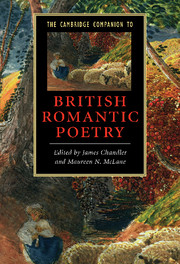Book contents
- Frontmatter
- Introduction: The companionable forms of Romantic poetry
- 1 The living pantheon of poets in 1820: pantheon or canon?
- 2 Romantic poetry and antiquity
- 3 Romantic meter and form
- 4 Romantic poetry and the standardization of English
- 5 Thinking in verse
- 6 Romantic poetry and the romantic novel
- 7 Wordsworth’s great Ode: Romanticism and the progress of poetry
- 8 Romantic poetry, sexuality, gender
- 9 Poetry, peripheries and empire
- 10 Romantic poetry and the science of nostalgia
- 11 Rethinking Romantic poetry and history: lyric resistance, lyric seduction
- 12 The medium of Romantic poetry
- 13 Romantic poets and contemporary poetry
- Index
- Series List
2 - Romantic poetry and antiquity
Published online by Cambridge University Press: 28 November 2008
- Frontmatter
- Introduction: The companionable forms of Romantic poetry
- 1 The living pantheon of poets in 1820: pantheon or canon?
- 2 Romantic poetry and antiquity
- 3 Romantic meter and form
- 4 Romantic poetry and the standardization of English
- 5 Thinking in verse
- 6 Romantic poetry and the romantic novel
- 7 Wordsworth’s great Ode: Romanticism and the progress of poetry
- 8 Romantic poetry, sexuality, gender
- 9 Poetry, peripheries and empire
- 10 Romantic poetry and the science of nostalgia
- 11 Rethinking Romantic poetry and history: lyric resistance, lyric seduction
- 12 The medium of Romantic poetry
- 13 Romantic poets and contemporary poetry
- Index
- Series List
Summary
In “The Four Ages of Poetry” (1820), Thomas Love Peacock archly complained that contemporary poetry was absurdly derivative of ancient models of inspiration and composition: “While the historian and the philosopher are advancing in, and accelerating, the progress of knowledge, the poet is wallowing in the rubbish of departed ignorance, and raking up the ashes of dead savages to find gewgaws [toys] and rattles for the grown babies of the age.” He castigates Scott, Byron, Southey, Wordsworth, Coleridge, Moore, and Campbell for their cannibalistic and anachronistic efforts, which he sees as no more than patching together “disjointed relics of tradition and fragments of second-hand observation” to produce “a modern-antique compound of frippery and barbarism.” It was indeed confidently believed that ancient societies, whether British, Greek, or Roman, shared virtues of originality and genius, and that modern poets should mine these seams. Southey's preparation before writing his epic Madoc was to “study three works . . . the Bible, Homer, and Ossian,” and Hazlitt argued that the four prototypes of poetry were, similarly, the Bible, Homer, Ossian, and Dante.
There is of course nothing new in Peacock's attack: The Dunciad Variorum (1729) and the Memoirs of Martinus Scriblerus (1741) set the tone in the eighteenth century for satirizing the enervated taste of antiquarians and connoisseurs, and this mockery was carried through into the engravings of Hogarth and Gillray. But there is something new in Peacock's criticism of the ubiquity of the antique and the arcane.
- Type
- Chapter
- Information
- The Cambridge Companion to British Romantic Poetry , pp. 35 - 52Publisher: Cambridge University PressPrint publication year: 2008
- 1
- Cited by



